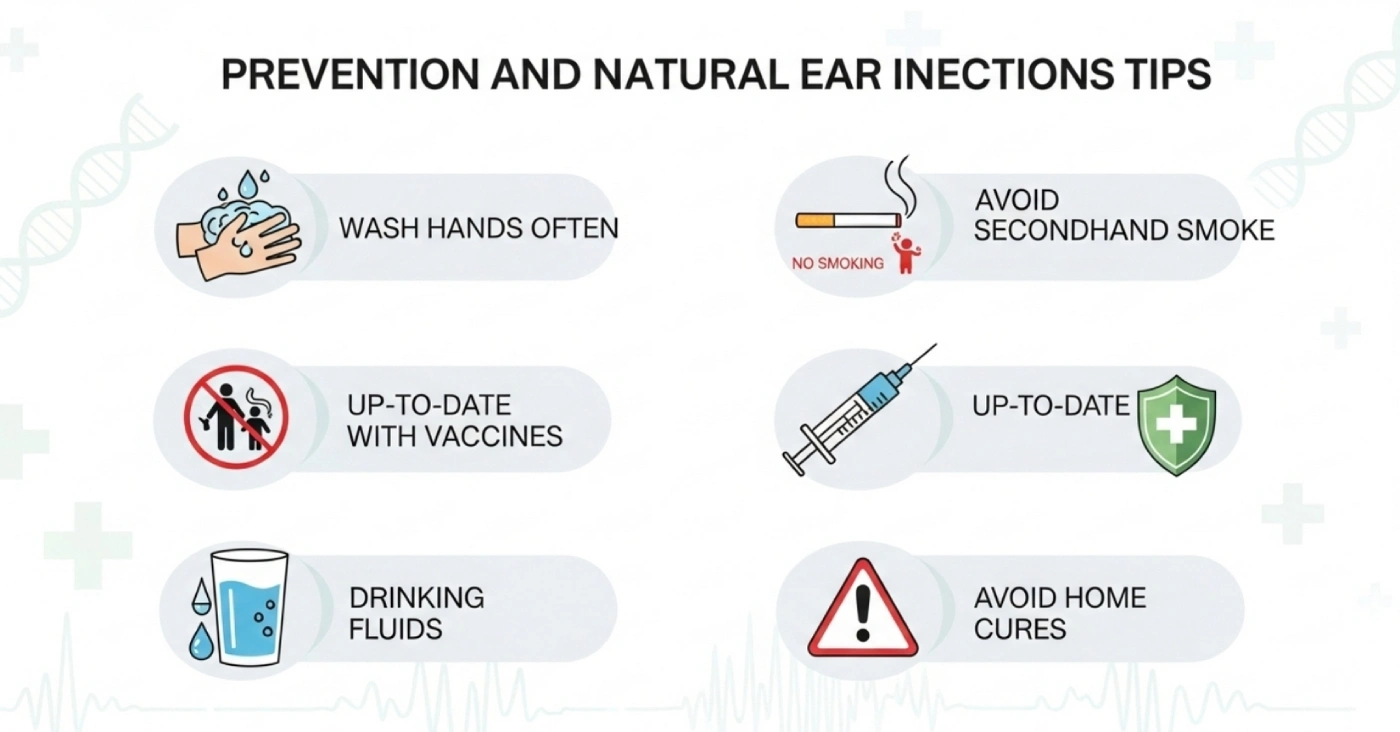
Ear infections are very common, especially in children. Many individuals, especially parents, ask: Are ear infections contagious? The answer is not that straight, while ear infections are not contagious, but you can catch the cold or flu virus which often leads to one. Think of it this way—your friend’s ear pain is not contagious, but their sneeze might still give you the cold that could later turn into your own ear infection.
Are Ear Infections Contagious?
No, ear infections are not contagious. However, here is how they may spread;
- The infection in the ear itself does not spread from person to person.
- What are the viruses and bacteria that cause the infection in the first place?
- Example: If your child has an ear infection because of a cold virus, their sibling may catch the cold—not the ear infection. But after catching the cold, the sibling might develop their own ear infection a few days later.
How Do Ear Infections Spread if Not Contagious?
You can’t spread the fluid or inflammation in the ear. What spreads are the germs that get into the nose and throat? These germs travel to the middle ear and cause infection.
Everyday examples:
A child in daycare sneezes on toys. Another child touches the toy, rubs their nose, and later develops a cold. That cold blocks the Eustachian tube and leads to an ear infection.
Adults sharing utensils, kissing on the cheek, or being in close contact with someone sick can catch the virus—but not the ear infection itself.
| Type of Spread | Example | What Actually Spreads |
| Viral (cold/flu) | Coughing, sneezing, sharing drinks | Cold or flu virus |
| Bacterial | Sharing utensils, touching contaminated hands | Bacteria like Strep pneumoniae |
| Direct contact | Hugging/kissing someone with a cold | The germs, not the ear infection |
Causes and Types of Ear Infections
The following are some of the causes behind ear infections;
- Otitis Media (Middle ear infections): Usually after a cold. Fluid gets trapped behind the eardrum. Bacteria or viruses grow in that fluid.
- Outer ear infections (swimmer’s ear): Water stuck in the ear canal after swimming or showering creates a moist place where bacteria thrive.
- Inner ear infections (labyrinthitis): Usually caused by viruses, leading to dizziness or balance problems.
Simple example: Imagine the ear like a sink with a drain. If the drain (Eustachian tube) gets blocked by mucus from a cold, water (fluid) collects in the sink (middle ear). That still water is the perfect place for germs to multiply.
Did you know?
Acetaminophen is common for ear infections which is used for pain and fever relief, is metabolized in the liver. And a simple at home pharmacogenomics test (PGx test) can give insights into at what pace; fast, slow, or normal, this drug may be metabolized in your liver.
Symptoms of Ear Infections
On top of ear fullness/pain, loss of hearing, or headache, the following may be the symptoms:
Middle ear infection systems
- Ear pain
- Trouble hearing or muffled sounds
- Fever and irritability
Outer ear infection systems
- Pain when you touch or pull the ear
- Redness or swelling around the ear canal
- Fluid or pus draining from the ear
Inner ear infection systems
- Sudden dizziness (vertigo)
- Nausea or vomiting
- Balance problems
Know your body’s response to medications
Book an at-home FSA/HSA eligible, PGx test from RPh LABS (a CLIA accredited lab) today, and know how your body responds to 125+ medications.
Prevention and Natural Support for Ear Infections
Prevention of ear infection may be possible with:
- Wash your hands often: This reduces the risk of catching colds and flu.
- Avoid secondhand smoke: Smoke irritates the airway and increases infections in children.
- Stay up-to-date with vaccines: Shots like the flu vaccine and pneumococcal vaccine protect against germs that cause ear infections.
- For swimmer’s ear: dry your ears after swimming or bathing. Tilt your head to let water drain or use a hair dryer on low, held at arm’s length.
Natural support may include:
- Warm compress on the ear for comfort
- Drinking fluids and resting so the body heals faster
- Avoid home “cures” like ear candling, garlic oil, or pouring liquids into the ear—they can do more harm than good

Does a Strong Immune System Help?
Yes. Your body’s immune system is your “security guard.” If the guard is strong, it can prevent colds and flu from causing trouble in the ears.
Ways to strengthen the immune system:
- Get enough sleep (7–9 hours for adults)
- Eat fruits, vegetables, lean protein, and whole grains
- Exercise regularly
- Stay hydrated
- Reduce stress
Example: Two kids are exposed to the same cold virus. The child who is well-rested and vaccinated may fight it off quickly, while the tired child may develop a cold that later turns into an ear infection.
Common Medications for Ear Infections
Pain relievers, Antibiotics, and ear drops are commonly used to treat ear infections. Pain relievers like Acetaminophen (Tylenol) and ibuprofen are used to reduce pain and fever.
Doctors prescribe antibiotics only if the infection is bacterial and doesn’t improve on its own. The most common is amoxicillin. The ear drops are usually used for outer ear infections (often in swimmer’s ear).
Conclusion
Ear infections are not actually transferred from someone’s ear directly. Instead, it is spread through the cold or flu virus that sometimes leads to one. Good hygiene, vaccines, and a healthy immune system help protect you. In any case, if you experience these conditions, seek urgent help from your doctor for evaluation and treatment.
Disclaimer: This blog is for informational purposes only and does not constitute medical, legal, or professional advice. While we strive for accuracy, errors or omissions may occur.
Some images in this blog may be AI-generated or for illustrative purposes only.



Leave a Reply